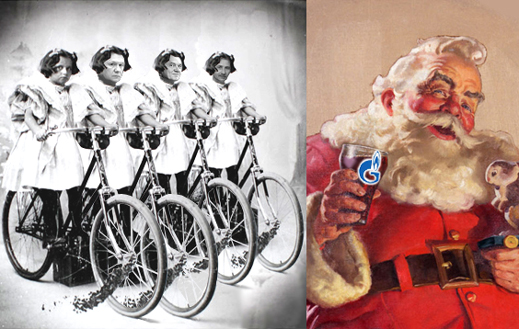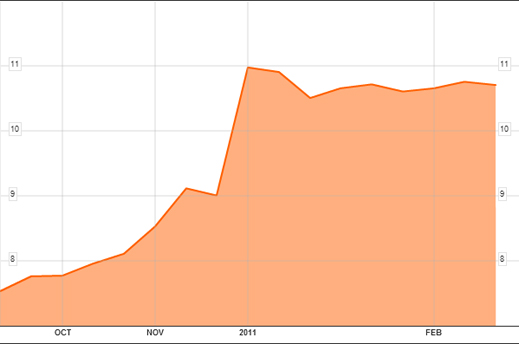
By John Helmer, Moscow
It is the most famous argument in favour of suspending disbelief in the history of the United States.
Every year the trillion-dollar retail sector of that country turns several billions of dollars in profits by merchandising the belief through the cash register. That is, the belief in Santa Claus, first raised in a letter by Virginia O’Hanlon (left image), an 8-year old, to the editor of the New York Sun in September of 1897 – well before she was due to receive her presents. The original editorial in response to her letter can be read below.
Now on Friday last, Gazprom held its Annual Investor Day, and among the many things that were announced in response to questions, the company spokesman, Sergey Kupriyanov, disclosed details of a transaction, which was finalized just before Santa Claus made his last sleigh ride to Moscow, on December 20.
What happened was that Gazprom says it sold a 9.4% shareholding in smaller rival gas producer, Novatek, whose controlling shareholders are Gennady Timchenko (3rd left, after Alexei Miller) and Leonid Mikhelson (right image). Gazprombank was the buyer. Gazprombank does not call itself a state owned bank. But its shareholders are all state-controlled entities, including Gazprom (42%) and Gazprom’s pension fund Gazfond (50%). In this related-party transaction, the price paid for the Novatek stake, disclosed by Gazprom on Friday, was Rb57 billion ($1.9 billion).
On December 21, according to a disclosure posted by Novatek, Timchenko and Mikhelson announced that they had signed a two-year option agreement with Gazprombank to buy the stake at an undisclosed price.
Gazprom’s financial reports are audited by PriceWaterhouseCoopers, and here is what the financial statements, issued on February 10, say about the Novatek shareholding sale. At Note 29, page 34, it is reported by the auditors: “In December 2010 the Group sold 9.4% interest in OAO NOVATEK to Gazprombank Group for RR 57,460”. There is no reference back to page 18, where the size of Gazprom’s stake in Novatek is reported as 19%, and the “estimated fair value” of this stake is given as Rb153.8 billion as of September 30, 2010.
Even 8-year old Virginia O’Hanlon could probably divide the big number by 19, and multiply the result by 9.4. The result is that, according to Gazprom’s own audited financial report, it had valued the Novatek stake it sold to Timchenko and Mikhelson on December 20 at Rb78.5 billion just three months earlier. In short, Gazprom accepted a 27.4% discount during a period when Novatek’s share price in the market was going up – by 40%, in fact.
Bloomberg 6-month Novatek chart:

Was that Santa Claus coming down the Timchenko-Mikhelson chimney as the Novatek share price was going up in smoke?
Kupriyanov, the principal spokesman for Gazprom, declines to answer questions about how the sale price was calculated by Gazprom. Denis Igantiev, Gazprom spokesman for the foreign press, said: “All the information Dr Helmer needs is published in the Q3 2010 IFRS report.”
Gazprombank declines to say what price Timchenko and Mikhelson have agreed to pay when or if they exercise their option. Timchenko’s Moscow lawyer, Khristophor Ivanyan, did not reply to a request for confirmation of the option price. Mikhelson was contacted at his Novatek office, but he also did not respond to the request to identify the option price.
But don’t take my word for this munificent tale. In an unusual display of Moscow brokerage consensus, here is how Renaissance Capital and others have reported this deal. Let theirs be the final word on whether there is a Santa Claus in Moscow:
“Last Friday (11 February), Gazprom held its annual investor day. One of the key topics of the day’s Q&A session was the sale of 9.7% of Novatek to Gazprombank, which has raised concerns about a continued worsening of corporate governance at Gazprom. According to Gazprom’s 3Q10 financial statements, the stake sale price was RUB57bn, or about RUB195/share, representing a 36% discount to the share price on 20 December, when the deal was completed. We were somewhat confused that Gazprom spokesman Sergey Kupriyanov provided an explanation of the transaction in the presence of the company’s CFO – who we think would have been better suited to addressing such questions. While formal arguments from Gazprom about low liquidity in Novatek shares, the need for cash rather than options, and previous agreements reached before Novatek’s share price had reached its all-time high, might have some merit, we doubt they will soothe deep investor disappointment about the way this transaction was handled. As a result, we think Gazprom’s share price performance may lag the market for the next few weeks” – Ildar Davletshin, Renaissance Capital, February 14, 2011.
“NOVATEK stake sold at discount in 4Q10. Gazprom reported the sale of its 9.4% in NOVATEK to Gazprombank, of which it owns 41%, for $1.9bln, about 35% below the market value of the stake on MICEX. Although we estimate Gazprom’s ROI on its NOVATEK investment at 15-16%, and Gazprombank is an associate, the deal does not appear attractive to Gazprom’s minority shareholders. We reiterate our Hold recommendation on the stock” – Alexei Kokin, Uralsib Bank, February 14, 2011.
“Another detail attracting attention in the results was the disclosure that Gazprom sold a 9.4% stake in Novatek in December. Gazprombank paid RUB 57.5bn for the stake, a roughly 31% discount from the market price at the time; Interfax cited Gazprom’s press service as saying that market prices were only one of the factors affecting transaction prices in such large sales. Gazprom continues to own a 10% stake in Novatek…Regarding the low price of its stake in NOVATEK sold to Gazprombank, the company’s management claimed that the price was set sometime at the end of the summer or the beginning of autumn 2010 when NOVATEK’s market value was lower than now, and that it is inappropriate to compare the market price with the price of such a large deal. Gazprom assured investors that the gain from this deal will be added to net income and allocated to dividends.” – Artem Konchin, Unicredit Securities, February 11-14, 2011.
“Gazprom revealed earlier today that its earlier announced sale of a 9.4% stake in Novatek to Gazprombank (reported on 20 Dec 2010) was conducted at a 42% discount (or $1.3bn) to the market value as determined by Novatek’s GDR price on LSE. Interfax previously reported on 15 Nov 2010 that Gazprom’s Board of Directors was considering selling the stake at the market value as determined by Novatek’s GDR price…View: The substance and delayed timing of the disclosure represents yet another blow to Gazprom’s corporate governance and follows the string of recent questionable disposals, such as of the company’s direct or associated stakes in Sibneftegaz, Severenergia and Sibur. While the value loss related to the sale of the Novatek’s stake is not significant (representing less than 1% of Gazprom’s current market capitalisation), it is bound to perceived by the market as weakening the investment case for Gazprom…Valuation and action: We believe Gazprom’s weak corporate governance is the main reason for its extraordinary low valuation, trading at a 2011E consensus P/E multiple of just 4.9. While changes in corporate governance are notoriously difficult to predict, we note that the possible management changes associated with the termination of Gazprom’s CEO contract in May 2011 as well as our expectations of a substantial increase in dividends suggest there is a chance for improved performance in 2011. We will be eagerly awaiting the response from the Russian state which is the single largest loser from this transaction being a 50% shareholder in Gazprom” – Alexander Burgansky, Otkritie, February 10, 2011.
| NEW YORK SUN, September 21, 1897
DEAR EDITOR: I am 8 years old. “VIRGINIA O’HANLON. VIRGINIA, your little friends are wrong. They have been affected by the skepticism of a skeptical age. They do not believe except [what] they see. They think that nothing can be which is not comprehensible by their little minds. All minds, Virginia, whether they be men’s or children’s, are little. In this great universe of ours man is a mere insect, an ant, in his intellect, as compared with the boundless world about him, as measured by the intelligence capable of grasping the whole of truth and knowledge. Yes, VIRGINIA, there is a Santa Claus. He exists as certainly as love and generosity and devotion exist, and you know that they abound and give to your life its highest beauty and joy. Alas! how dreary would be the world if there were no Santa Claus. It would be as dreary as if there were no VIRGINIAS. There would be no childlike faith then, no poetry, no romance to make tolerable this existence. We should have no enjoyment, except in sense and sight. The eternal light with which childhood fills the world would be extinguished. Not believe in Santa Claus! You might as well not believe in fairies! You might get your papa to hire men to watch in all the chimneys on Christmas Eve to catch Santa Claus, but even if they did not see Santa Claus coming down, what would that prove? Nobody sees Santa Claus, but that is no sign that there is no Santa Claus. The most real things in the world are those that neither children nor men can see. Did you ever see fairies dancing on the lawn? Of course not, but that’s no proof that they are not there. Nobody can conceive or imagine all the wonders there are unseen and unseeable in the world. You may tear apart the baby’s rattle and see what makes the noise inside, but there is a veil covering the unseen world which not the strongest man, nor even the united strength of all the strongest men that ever lived, could tear apart. Only faith, fancy, poetry, love, romance, can push aside that curtain and view and picture the supernal beauty and glory beyond. Is it all real? Ah, VIRGINIA, in all this world there is nothing else real and abiding. No Santa Claus! Thank God! he lives, and he lives forever. A thousand years from now, Virginia, nay, ten times ten thousand years from now, he will continue to make glad the heart of childhood. |











Leave a Reply